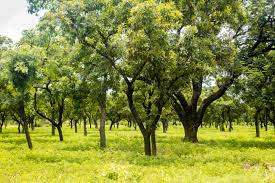Over the years, farming communities within the nation’s High Forest, Guinea, Savannah Ecological, and Forest-Savannah Transition zones have experienced indiscriminate bush burning, loss of farm animals to herdsmen, and unproductive crop output. These activities have affected the livelihoods and income of rural dwellers.
The implementation of the European Union (EU)-funded Landscape and Environmental Agility across Nations (LEAN) project, implemented by World Vision in these areas, has helped fight against environmental degradation, affecting crop production and food security.
It is also directly contributing to the national efforts of conserving biodiversity, improving the livelihoods of smallholder farmers, increasing climate change resilience and reducing emissions from land use changes.
This was disclosed at a media engagement organised by World Vision to sensitise selected media persons on the essence and impact of the LEAN project held in Tamale.
The EU LEAN Project Manager at World Vision, Joseph Edwin Yelkabong said the project has contributed to halting desertification that marches violently northwest, by addressing some major barriers in selected landscapes across the Savannah, High forest and Transitional Ecological zones of Ghana.
“This is because lands were being degraded, and food production was decreasing, and when we have nothing to live on, hunger is likely to be our major poverty issue. Thus, we need a strategy like the LEAN to ensure food security and arrest environmental issues that we are currently facing,” he added.
The LEAN project will help to build collaborative, participatory, gender-sensitive and informed decision-making processes at the local level with all relevant stakeholders across multiple sectors. Strong community-based governance structures will ensure that decisions are gender-sensitive and locally owned and there is long-term uptake of agreements beyond the action interventions, he explained.
He noted that continued education has helped increased knowledge of good agricultural methods among the farmers.
The governance structures would include non-indigenous groups, women, youth, landless people and others and connect the local landscape initiative to the national policies for scale-up and replication, he added.
The project is said to be targeting 36,000 smallholder farmers and rural people across its three priority areas and working closely with decentralised departments, local community leaders, and farmers to gradually restore the degraded landscapes and diversify livelihoods through assisted natural regeneration in West Gonja and Kassena-Nankana West Districts in the Savannah and Upper East regions, respectively to achieve the set goals.
In the Savannah Landscape, 50 Communities into Shea, Cashew, Dawadawa, Baobab and Rosewood are being engaged for improved productions.
The four-year project also aims to support smallholder farmers in the affected regions to access market incentives and establish diversified income streams. LEAN also plays a key role in ensuring that biodiversity is conserved, as well as building climate change resilience and the reduction of emissions from land use changes while helping farmers to improve their livelihoods.
The project is in partnership with Rainforest Alliance, Tropenbos Ghana (TBG), and EcoCare Ghana since its inception has helped to educate community members and farmers on the occurrence of indiscriminate bush burning causing the degradation of farmlands.










